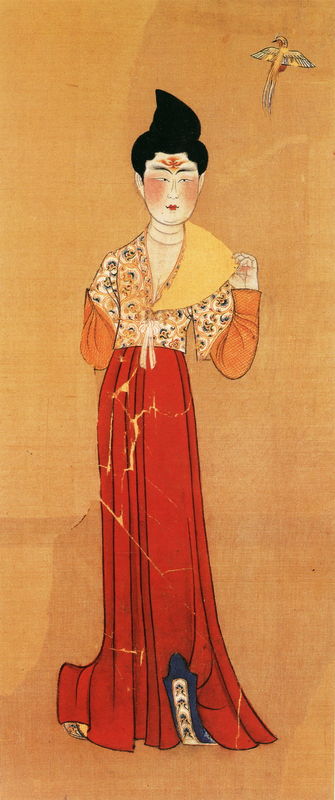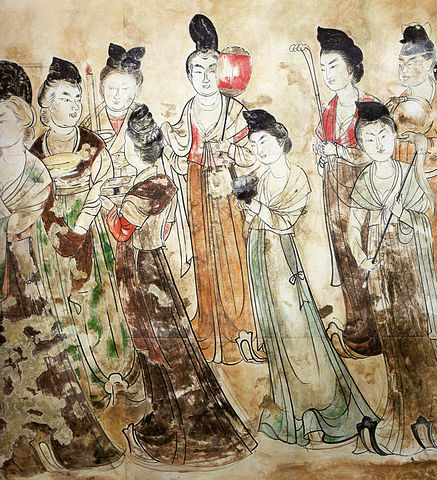
Thammasat University students interested in poetry, the arts, China studies, East Asian culture, globalization, comparative literature, history, sociology, and related subjects may find it useful to participate in a free 26 September online Zoom Webinar Book Talk on Du Fu Transforms.
The Zoom event, on Monday, 26 September 2022 at 6pm Bangkok time, is organized by the School of Humanities, Center for the Study of Globalization and Cultures (CSGC), Department of Comparative Literature, University of Hong Kong (HKU).
The TU Library collection includes some books about different aspects of the life and works of Du Fu.
The main speaker at the event will be Assistant Professor Lucas Bender, who teaches Chinese literature in the Department of East Asian Languages and Literatures, Yale University.
The event moderator will be Assistant Professor Beth Harper of the Department of Comparative Literature, School of Humanities, HKU.
The event description follows:
Du Fu (712–770) came of age in an era marked by confidence that the accumulated wisdom of the cultural tradition could guarantee Chinese civilization’s continued stability and prosperity. When, however, the Tang dynasty collapsed in 755 to An Lushan’s rebellion, he began to question contemporary assumptions about the role that tradition should play in making sense of experience and defining human flourishing.
In this book, Lucas Bender argues that Du Fu’s evolving and experimental poetics in the wake of the rebellion have played a pivotal role in the transformation of Chinese poetic reading from the Tang to the present day. In reimagining his relationship to tradition, Du Fu anticipated important philosophical transitions from the late-medieval into the early-modern period and laid the template for a new paradigm of poetry’s relationship to ethics. His work also presents an interesting model for adapting to a fact of human moral experience that is increasingly obvious in our own time: that the moral ideas writers have inherited and use to make sense of their experience will, in most cases, not be those through which their works will be received and interpreted in generations to come.
Students are invited to register at this link:
https://hkuems1.hku.hk/hkuems/ec_regform.aspx?guest=Y&UEID=83907
With any questions or for further information, please write to
gchallen@hku.hk
Du Fu was a Chinese poet and politician of the Tang dynasty, who lived around 1500 years ago. He is sometimes considered the most influential poet in Chinese literature, although his main hope was to serve his homeland ably as a civil servant.
Arthur Waley, the influential English translator of Chinese poetry,avoided translating Du Fu’s work. This may be partly because writers about Du Fu have tended to focus on his admirable qualities as a civil servant, even more than his poetry. As a follower of Confucius, Du Fu was said to not “forget his lord even for the interval of one single meal.”
There were occasions when Du Fu expressed a sense of humor but these are not emphasized in writings about the poet. Instead, he is seen as a neo-Confucian sage, inspiring in his patriotism. Ten years ago, on the occasion of the poet’s 1300th birthday, his portrait became the basis for joking internet memes in China, since he is sometimes seen unfairly as a humorless example of moral seriousness.
Even during his lifetime, Du Fu was sometimes seen as too serious. As a young graduate, he failed a civil service exam and went traveling instead. He was finally appointed registrar in the crown prince’s palace, but the An Lushan Rebellion of 755 kept him from starting this job. Instead, Du Fu continued to voyage, writing about events he saw, including famine, political upheavals, and personal ordeals.
He did eventually become registrar, but some colleagues did not appreciate that Du Fu worked very hard and took his responsibilities extremely seriously. He spent many of his later years traveling. He is referred to as a poet-historian since his writing described political and social issues as well as personal worries.

Here are some translations by Stanton Hager of Du Fu’s poems which have been posted online:
Shore grasses, wind-thinned, bend before a breeze.
Alone on deck, I gaze above the tall mast at the night sky.
Stars, drooping down, disappear into vast flat plains
As the moon leaps up out of the great Yangtze.
Too late for literary fame, I must cast on that a cold eye.
Aged, ill, failing my duties, I must resign my post.
Drifting, ever drifting between sky and sand,
With what can I compare myself? None but a lost gull.
Autumn downpour ended,
stormclouds dwindle to feathers;
journeying ten thousand miles,
boldly in blows the west wind.
At dawn the countryside
gladdens the eyes of farmers
grateful that the rains
have not ruined their crops.
Bits of summer green
still cling to the willows;
thousands of tiny pear blossoms
speckle red the hills;
yellow eggplants entice
with luscious fruitfulness–
and a lone wild goose
leaps into the clear blue sky.
Golden orioles warble melodies
in the green willows.
Snowy egrets scribble a white line
across the blue sky.
Facing west, framed by my window:
peaks ice-capped a million years.
Facing east, moored at my door:
a small boat ten thousand miles from Wu.
Blasted by autumn rains, the grasses rot and die;
under the steps the jeuming flowers still flourish.
Leafy branches form a feathery bower,
sheltering countless gold blooms that glint like coins.
But a rasping cold wind whips and buffets them;
I fear they’ll find it hard to withstand being torn away.
Hair wild, I strive three times against the wind’s wall
and fail. Inhaling the jeuming’s fragrance, I weep.
In late autumn, lashing winds still thrash unceasing rains;
All the world’s seas, all watery wastes, uplift into one black cloud.
These dark days, who can say a horse going is not an ox coming?
Who now can distinguish the muddy Jing River from the clear Wei?
Sodden, wheat is sprout-ruined; millet ears are blackened by rot.
Farmers and their wives from every village report the same bad news.
In Chang-an, a silk bed-quilt can be had for a mere bucket of rice,
And both parties, their lots improved, deem the trade fair.

(All images courtesy of Wikimedia Commons)
